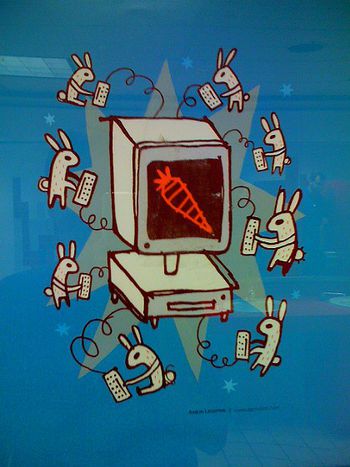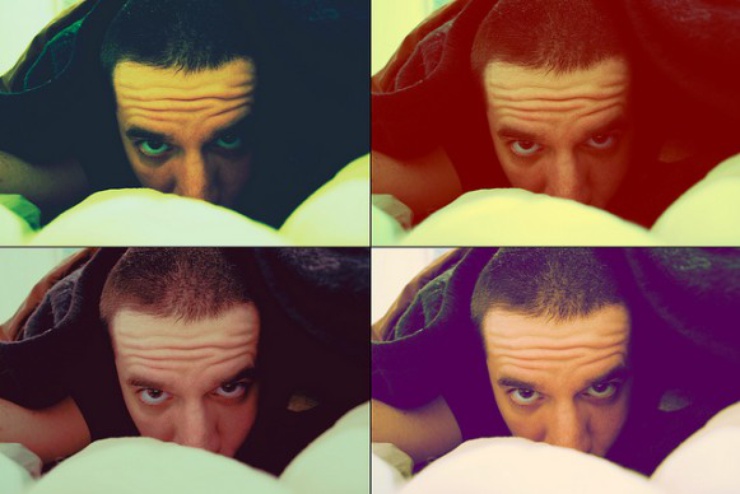
Medicine’s new dot-com revolution
Published on
From clinical trial recruitment and virtual medical schools to online diagnosis and the use of cloud computing to store medical records, web 2.0 is throwing up some exciting and frightening possibilities, says Gary Finnegan
I had a crick in my neck when I woke up this morning. I could visit my GP or start lobbing search terms into google. What if it’s meningitis? Am I experiencing confusion or nausea, asks the first website returned by the search engine. I endured a brief dizzy spell when I leapt out of bed this morning upon realising I was late for work. It might be bleeding or inflammation of the brain, I’m told by another helpful site. It could be cervical osteoarthritis. Let’s not rule out a brain tumour. But I have nothing more than 'cyberchondria'. My GP, or my own common sense, might have suggested the combination of red wine overdose and a bad night’s sleep were responsible for the muzzy head and stiff neck, but internet searches are fast and free – even if it can be a blunt diagnostic tool.
Cyberchondria
The problem of unbridled access to medical information of dubious quality has been vexing the medical fraternity for the bones of a decade. Time magazine’s medical columnist Dr Scott Haig describes the agony of dealing with 'medical googlers' – patients who turn up at his surgery armed with a handful of possible diagnoses and second-guesses. ‘These patients are often suspicious and distrustful, their pressured sentences burst with misused, mispronounced words and half-baked ideas,’ Haig writes. Patient advocacy groups were up in arms: Haig was an old-fashioned paternalist with a god complex. He was just afraid of the modern informed patient and too slow to embrace change. Both sides had a point: not all online information is useful, but wishing the net didn’t exist comes across as either naïve or arrogant.
Wishing the net didn’t exist comes across as either naïve or arrogant
But things are improving. Google says around 6% of medical information online is inaccurate. It’s easy to find discussion groups with thousands of users who can exchange their experience. The evolution of the net has enabled doctors and patients to harness its power for good rather than ill. Web 2.0 is characterised by more interactivity and collaboration. Leading thinkers are embracing the web’s potential to make a positive contribution to medicine. The university of Plymouth in the UK has established a sexual health simulation to educate users about safe sex – they even give out virtual condoms. The logic behind the programme is simply to go wherever high-risk groups can be found, even if it’s not in this world.
Dr. Google

Google has the most influence over the future of how the internet is used and has now turned the full glare of its spotlight on health. Addressing an audience in Orlando, Eric Schmidt, chairman and CEO of google, scolded the medical profession for being latecomers to the revolution. 'The medical establishment has taken way too much time to learn that the internet is a disruptive innovation that has overturned the status quo and has levelled the playing field between expert and novice; in this case between doctor and patient. While some doctors might find that threatening to their status as an expert, the web is now providing the kind of information doctors need to be good at their job and the information that makes patients healthier and smarter,' says Dr Schmidt, who jokes that two-thirds of internet users say they trust the net, more than the proportion of people who say they trust doctors; the web is now home to a better-educated patient capable of seeking out information.
The web is now providing the kind of information doctors need to be good at their job
But google has bigger ideas. Schmidt wants patients’ medical records to be accessible from anywhere in the world. 'A huge amount of information was lost after Hurricane Katrina. That wouldn’t have happened if the information was stored on several servers at separate locations.’ This idea spawned the internet in the first place: the US military wanted a network of computers where sensitive information could be securely shared between several centres. What google now wants through ‘google health’ is password-protected access to individuals’ health information. This would eliminate the need to transfer physical files when changing doctor, and allow health records to be read if a patient is hospitalised while abroad. ‘In the hands of the wrong workplace colleague, friend or vendor, this information could be used against patients,' warns Jamie Court of the consumer watchdog group.
Health impact
The interactive nature of the web can itself have an impact on health status. The New York Times warns that blogging and endless inane updates on twitter can be stressful. But along comes Scientific American with a story saying blogging is a stress coping mechanism which boosts memory and the immune system, say researchers. It’s further evidence of how the net is influencing health from all directions. Back in the real world, this web 2.0 lark might seem remote in a country with patchy broadband coverage. Nonetheless, technology is dramatically transforming healthcare, and doctors are working hard to keep up. Now that mainstream medical schools and multinational companies are embracing the changes, there may be less fear that patients will replace their GP with 'Dr Google'.
Images: Carrot poster (cc) Rafael Mejia Is Alive; Guy under blanket (cc) B Rosen/ both courtesy of Flickr



